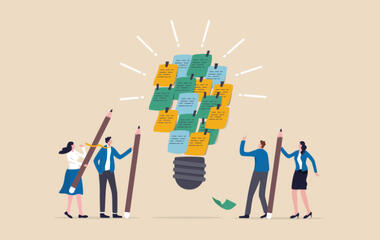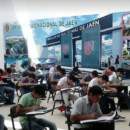A more conscientious population? Higher education can help

It’s not rare to find people, especially young people, who think that a degree is going to guarantee them a good job, and with that a good future. This is because we are raised with the message that you need a degree to be someone in life, which is not true in the same way that it is not true that a degree will give you a job. It may make it a little bit easier to get a good one, but it’s not a guarantee.
As we grow and mature we realise these fallacies and we make up our own minds about it. However, that doesn’t mean that higher education is not important or that when we grow we think of it as something that is unnecessary for society because we all know we need professionals to keep the world spinning – people who are specialised in different areas who are willing to serve, teach, fix, make, discover; people to make our society better, because education is the foundation of any society.
In higher education people don’t just learn skills or information about specific topics of their choice. Almost without realising it, most of them develop a more concrete sense of their moral values, their opinions. They develop a more open mind and the maturity to understand and accept other points of view. They tend to see the world with a fresh perspective, with more open eyes. This can lead them to have the will to solve problems and help others.
It’s not a secret that Latin America and the Caribbean have some problems with the quality of life for the majority of their population – issues that are impossible to solve without the abilities and mentality that higher education brings to people.
Knowledge and practice are the solution
To solve any problem you need to know what is causing it, understand it and what you can do about it. It doesn’t sound too hard when you put it like that. It’s what we do every day in our lives – solve problems – but when the problem is a major one, things start to become more interesting.
The reality is that not everybody has the knowledge to sustain a proper conversation about poverty, world hunger, climate change, industry and consumerism, sustainability and economics, and even less so to find a realistic solution for those issues.
What is worse is that a lot of people don’t care that much to even listen or try to understand; their selfishness doesn’t let them see that it’s a real problem that is perhaps not affecting them now, but will affect all of us sooner than we think if we don’t do something about it.
That’s why we need people with knowledge, people who specialise in these topics and those that relate to them; and we need people with the will to do something.
If you have the will to listen, learn and do what is best for all of us, then welcome to the table because the will and disposition to do the work is as important as the knowledge. It is useless to have discussions and find solutions without having the people who can put them into practice.
SDGs in Latin America and the Caribbean
The Latin American and Caribbean region has been divided in terms of progress when we talk about the Sustainable Development Goals (SDGs), with varied results when it comes to the various goals.
I’m from Venezuela, a country that has been called one of the “lowest-scoring countries” in Latin America and the Caribbean by the 2022 SDG Gender Index, which says that it went in the “wrong direction”.
If I’m honest, I can see why. The situation here has been going downhill overall. Systems that were already not optimal, such as education and healthcare, have been slowly getting worse and it could be said that this is due to poor management and a lack of organisation on the part of the competent authorities.
A lack of qualified people, not only in knowledge but also in maturity and values, has prevented the country from improving. I have seen how pride, lack of concern, selfish interests and immaturity have prevented people from listening to others, from considering other options, from doing what is best for everyone. These things are what prevent us from moving forward as a society.
This is a recurring problem throughout Latin America and the Caribbean, affecting different sectors such as basic services (water and electricity), programmes to protect the environment, measures to guarantee gender equality and sustainability when it comes to consumption and production. Even the economy has been affected to some extent because of these reasons and all of this combined only serves to make the quality of life fall.
What we need
What we need are people with knowledge, people who are willing to do the work, who have the maturity and a genuine interest in improving society and the lives of others, people who are not blinded by pride or personal interest and are willing to listen and take into account different possibilities, and people who have the maturity to agree and be able to achieve the objectives needed to make a collective difference.
Lately, I have been asked the question, “How do you see the world in 50 years?” quite a lot, and I’m always hesitant to answer because I don’t want to say that I see a world with no water, without life in the sea, at war, with people dying due to poor quality of life, without beautiful surroundings.
I don’t want to say that I see a world where human selfishness and ambition drove us off a cliff, a world where our inability to come to a solution together led us to a disaster we could have avoided if not for our selfishness, lack of intelligence, maturity and empathy, because these are the reasons why we are in this situation in the first place.
That’s why I always change the question to: “How do you want to see the world in 50 years?” because I want to see a world full of life, where everyone is treated the same, where everyone has the same opportunities, where there is no fear of each other, a world where we live as one.
And I want people to ask themselves this question because we can change things to get to where we want. We can do it better. Human beings have an extraordinary capacity to get what they want; it’s time for us to want the same thing: a good future.
Higher education has an essential role to play since it is a step towards the formation of a more conscientious population, and that is what we need.
Overall, there are 17 SDGs and 169 targets for fulfilling them. They are listed here.
Read the full article, first published by the University World News, A more conscientious population? Higher education can help.
Author
León is 18 years old and has just graduated from high school in Venezuela where he hopes to become a doctor. His goal is to help to improve people’s health and their quality of life.
RELATED ITEMS








